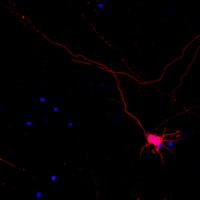Trafficking-dependent and -independent pathways of neurotransmitter transporter regulation differentially involving p38 mitogen-activated protein kinase revealed in studies of insulin modulation of norepinephrine transport in SK-N-SH cells.
Apparsundaram, S, et al.
J. Pharmacol. Exp. Ther., 299: 666-77 (2001)
2001
Pokaż streszczenie
Presynaptic, cocaine- and antidepressant-sensitive norepinephrine (NE) transporters (NETs) dictate levels of extracellular NE after vesicular release. Recent studies suggest that G protein-coupled receptors linked to protein kinase C (PKC) down-regulate cell surface NET protein levels and diminish NE uptake capacity. We identified distinct phosphatidylinositol 3-OH kinase (PI3K)-linked pathways supporting basal and insulin-triggered NE transport in the human noradrenergic neuroblastoma, SK-N-SH. Acute (0-60 min) insulin treatments produced a time- and concentration-dependent stimulation of NE transport, resolved in kinetic studies as an enhancement of NE transport capacity (Vmax) without an alteration in NE Km. Basal and insulin-modulated NET activities were reduced by the tyrosine kinase inhibitor genistein and the PI3K inhibitors wortmannin and LY-294002, but not by the PKC inhibitor staurosporine. PI3K activation was found to support phosphorylation of p38 mitogen-activated protein kinase (p38 MAPK). However, basal and insulin-stimulated NET activities were differentiated by their reliance on p38 MAPK activation. Thus, the p38 MAPK inhibitor SB203580 and SB202190 abolished insulin activation of NE transport yet failed to impact basal NET activity. Moreover, p38 MAPK activation and insulin activation of NETs were found to be sensitive to external Ca2+ depletion, blockade of voltage-sensitive Ca2+ channels, and inhibition of protein phosphatase 2A. Effects of tyrosine kinase and PI3K inhibitors on basal NET uptake appear to arise from a loss of cell surface NET protein, whereas the p38 MAPK-dependent enhancement of NE transport occurs without a detectable enhancement of surface NET. Our findings establish two distinct pathways for regulation of NE uptake involving PI3K, one linked to transporter trafficking and a second linked to Ca2+-dependent, p38 MAPK phosphorylation that promotes activation of cell surface NETs. | 11602680
 |














